TVS, Hero And Bajaj Seek GST Rate Cut On Two-Wheelers

- GST on two-wheelers are at par with luxury goods at 28 per cent
- New safety regulations from April 2019, and BS VI norms in 2020 due
- Safety and emission regulations expected to push prices higher
Three of India's leading two-wheeler manufacturers have appealed to the government to lower the goods and services tax (GST) rate on motorcycles and scooters from the current 28 per cent, contending that two-wheelers are not luxury goods, but provide basic mobility to the masses. The GST Council is scheduled to meet on January 10 to discuss lowering rates on certain items, and India's leading two-wheeler manufacturers are hoping that a reduction in the GST rate will help offset an expected increase in two-wheeler prices when combined braking system (CBS) and anti-lock brakes (ABS) become mandatory from April 1, 2019. Moreover, with a switch to Bharat Stage VI (BS-VI) emission norms in 2020, costs of two-wheelers are expected to go up further.

The Hero Splendor Plus is one of the largest selling two-wheelers in India
The latest two-wheeler manufacturer to join the growing voices among manufacturers demanding a reduction in price is TVS Motor Company. In a statement, TVS Motor Company Chairman Venu Srinivasan said that two-wheelers are used for mass mobility, and it's unfair for the GST rates on two-wheelers to be benchmarked against GST rates for luxury goods at 28 per cent. TVS Motor Company is the third Indian manufacturer after Hero MotoCorp and Bajaj Auto to have voiced concerns about the prevailing GST rates on two-wheelers.

TVS Motor Company Chairman Venu Srinivasan has called for a reduction in GST on two-wheelers
"Rising urbanisation, increasing purchasing power and the enhanced need for connectivity particularly in the mid-sized and smaller cities across India, has fuelled the two wheeler revolution for personal mobility. Given the importance of the two - wheeler segment as an item for mass mobility, the GST rates for two-wheelers undoubtedly needs to be reconsidered. It certainly cannot be benchmarked against the prevalent GST rates for luxury goods at 28%, especially given the current state of inconsistencies with the integrated multi-modal public transport systems across India. More so with new safety norms and BSVI integration also around the corner, both of which will increase two wheeler prices. It has become even more imperative to relook at the GST rates for two wheelers to ensure social inclusion that is sustainable in the longer run," said Srinivasan.
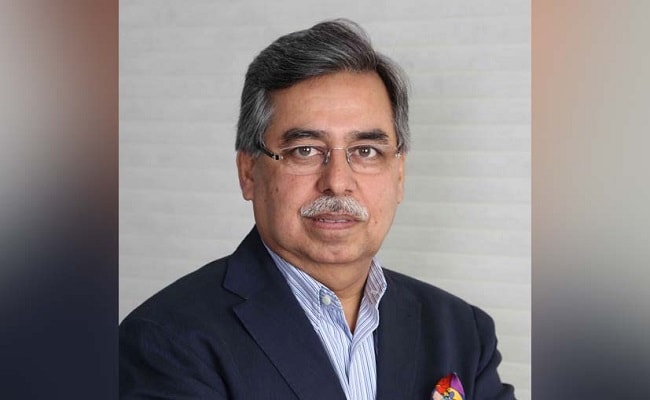
Hero MotoCorp Chairman Pawan Munjal has appealed for a reduction in GST rate on two-wheelers
Last week, India's largest two-wheeler manufacturer Hero MotoCorp had also called for a reduction in GST rates on bikes and scooters to 18 per cent from the current rate of 28 per cent. In a statement, Hero MotoCorp said that the reduction in tax would provide much-needed relief to two-wheeler customers across the country.
"Given that two-wheelers provide basic mobility to the masses, there is an urgent need to reduce the GST rate on two-wheelers from the 28 per cent bracket of 'luxury goods' to that of 18 per cent for mass usage items. The reduction in tax rate would not only help millions of two-wheeler customers, but also the entire value chain dependent on the sector. It is absolutely imperative to ensure growth in the auto sector to create and sustain inclusive economic growth. With the transition to BS VI emission norms, cost of two-wheelers will further go up. All these will put severe stress on the extremely cost-sensitive commuters, for whom the two-wheeler is a lifeline," Hero MotoCorp Chairman Pawan Munjal said in a statement.
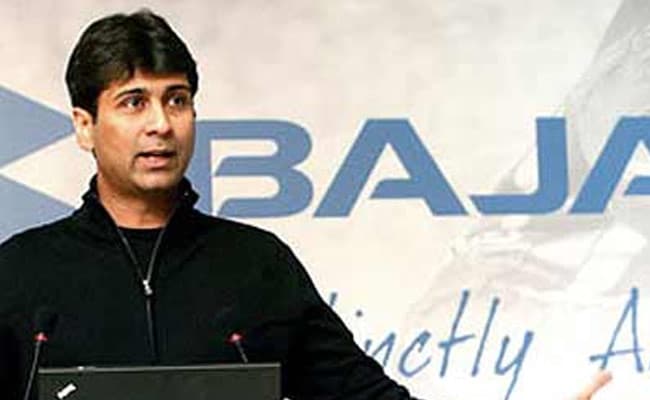
Bajaj Auto MD Rajiv Bajaj says new safety and emission norms will push prices further
Meanwhile, India's largest exporter of motorcycles, Bajaj Auto also backed a reduction in GST rates on motorcycles and scooters. Bajaj Auto MD Rajiv Bajaj though suggested that the reduction in GST should be tied to the introduction of new models, adding that rationalising prices should not be the sole aim, but any reduction should be timed with the new safety and emission norms that will anyway increase prices of two-wheelers.
"It will be a win-win solution to time any GST reduction with the safety or emission norms to mitigate the significant cost-up that's inevitable. Doing so separately would actually make things much worse for a while before making it hopefully better," Bajaj said.
In the calendar year 2018, Hero MotoCorp sold 80 lakh two-wheelers, registering a growth of 11 per cent over sales in 2017. In the period from April to December 2018, Bajaj Auto sales grew by 29 per cent, when the company sold 32 lakh motorcycles. In the same period, Hero MotoCorp sold 60 lakh two-wheelers. The latest safety regulations, which will come into effect from April 1, 2019, will require all two-wheelers to have combined braking system, and two-wheelers of 125 cc and above to have anti-lock brakes. New BS-VI emission regulations from 2020 will require all motorcycles and two-wheelers to introduce fuel-injection, which will further push prices of two-wheelers up. In the cost-sensitive mass market segments, these regulations will see prices increase by Rs. 5,000 to Rs. 8,000 depending on model to model.
Latest News
 Jafar Rizvi | Feb 11, 2026New Mercedes-AMG GLC 53 Debuts With Six-Cylinder Engine And Drift ModeThe new GLC 53 is the first AMG SUV to come with a dedicated 'Drift Mode'.1 min read
Jafar Rizvi | Feb 11, 2026New Mercedes-AMG GLC 53 Debuts With Six-Cylinder Engine And Drift ModeThe new GLC 53 is the first AMG SUV to come with a dedicated 'Drift Mode'.1 min read Bilal Firfiray | Feb 11, 2026MIDC to WLTP: Why The Switch In Testing Cycles Matters And How It Impacts YouMinistry of Road Transport and Highways (MoRTH) has decided to switch from the MIDC test cycle to WLTP. But what’s the technicality for you that’s going to affect you?3 mins read
Bilal Firfiray | Feb 11, 2026MIDC to WLTP: Why The Switch In Testing Cycles Matters And How It Impacts YouMinistry of Road Transport and Highways (MoRTH) has decided to switch from the MIDC test cycle to WLTP. But what’s the technicality for you that’s going to affect you?3 mins read Jaiveer Mehra | Feb 11, 2026New Toyota Highlander EV Is Brand's First 3-Row Electric SUVEntering its fifth generation, the new Highlander SUV offers a range in excess of 500 km on a full charge1 min read
Jaiveer Mehra | Feb 11, 2026New Toyota Highlander EV Is Brand's First 3-Row Electric SUVEntering its fifth generation, the new Highlander SUV offers a range in excess of 500 km on a full charge1 min read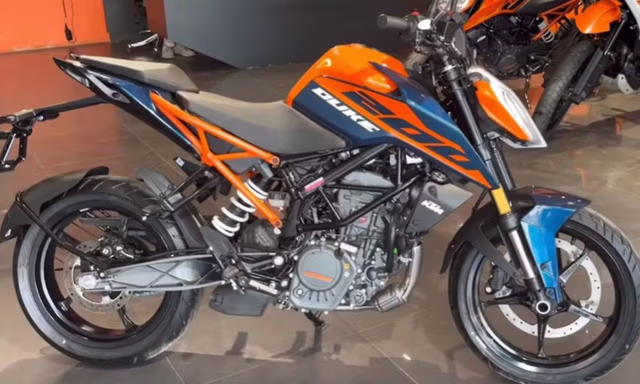 Janak Sorap | Feb 10, 2026KTM 200 Duke Receives Hardware Updates; Priced at Rs 1.94 LakhThe 200 Duke now gets a larger front brake disc, lighter alloy wheels, slimmer fork setup and a fresh new livery.1 min read
Janak Sorap | Feb 10, 2026KTM 200 Duke Receives Hardware Updates; Priced at Rs 1.94 LakhThe 200 Duke now gets a larger front brake disc, lighter alloy wheels, slimmer fork setup and a fresh new livery.1 min read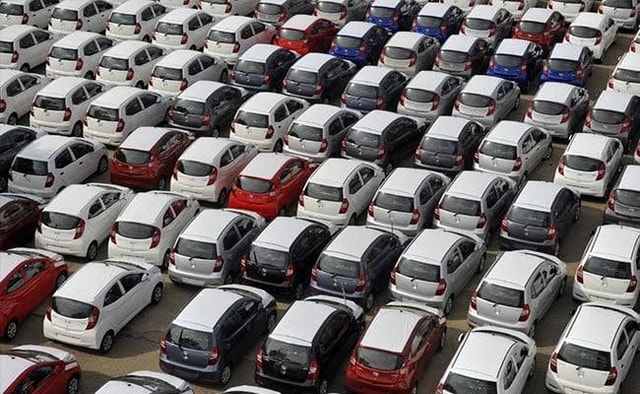 Bilal Firfiray | Feb 10, 2026January 2026 Auto Retail Up 17.61% YoY At 27.22 Lakh Units: FADA ReportFADA reports 17.61% YoY growth in January 2026 auto retail at 27.22 lakh units, driven by strong rural demand, two-wheeler surge and positive dealer outlook for the coming months.3 mins read
Bilal Firfiray | Feb 10, 2026January 2026 Auto Retail Up 17.61% YoY At 27.22 Lakh Units: FADA ReportFADA reports 17.61% YoY growth in January 2026 auto retail at 27.22 lakh units, driven by strong rural demand, two-wheeler surge and positive dealer outlook for the coming months.3 mins read Jafar Rizvi | Feb 10, 2026BYD Atto 3 Evo Unveiled: 443 Bhp AWD EV With Up To 470 KM RangeBYD adds a second motor to the Atto 3, bumping torque to 560 Nm while the FWD standard model switches to RWD.1 min read
Jafar Rizvi | Feb 10, 2026BYD Atto 3 Evo Unveiled: 443 Bhp AWD EV With Up To 470 KM RangeBYD adds a second motor to the Atto 3, bumping torque to 560 Nm while the FWD standard model switches to RWD.1 min read
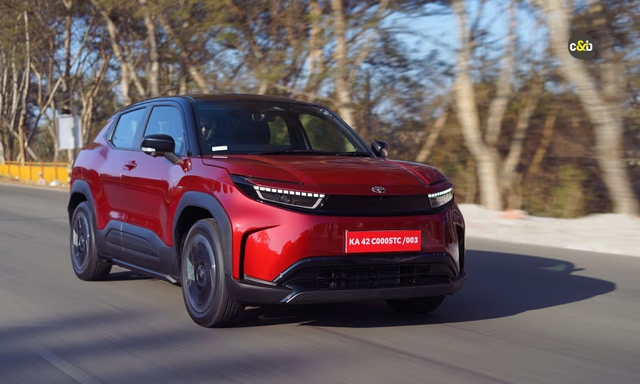 Girish Karkera | Feb 11, 2026Toyota Ebella EV Review: Compact And Fun-To-Drive With The Promise Of Stress-Free AftersalesNo hiding the fact that it is a clone of the Maruti Suzuki eVitara, but the first all-electric Toyota in India is reasonably well-rounded8 mins read
Girish Karkera | Feb 11, 2026Toyota Ebella EV Review: Compact And Fun-To-Drive With The Promise Of Stress-Free AftersalesNo hiding the fact that it is a clone of the Maruti Suzuki eVitara, but the first all-electric Toyota in India is reasonably well-rounded8 mins read Bilal Firfiray | Feb 10, 2026Tata Punch EV Long Term Review: Small EV With A Big-Hearted PersonalityWith the new Punch EV Facelift just around the corner, we decided to take a look at what it excels at and what could be improved.6 mins read
Bilal Firfiray | Feb 10, 2026Tata Punch EV Long Term Review: Small EV With A Big-Hearted PersonalityWith the new Punch EV Facelift just around the corner, we decided to take a look at what it excels at and what could be improved.6 mins read Bilal Firfiray | Feb 4, 2026Volkswagen Tayron R-Line Review: Sensible Flagship For IndiaVolkswagen has introduced a made-in-India flagship SUV that offers space, comfort, performance, and German driving finesse in a practical three-row package. But is the Tayron R-Line good enough?6 mins read
Bilal Firfiray | Feb 4, 2026Volkswagen Tayron R-Line Review: Sensible Flagship For IndiaVolkswagen has introduced a made-in-India flagship SUV that offers space, comfort, performance, and German driving finesse in a practical three-row package. But is the Tayron R-Line good enough?6 mins read Preetam Bora | Feb 2, 2026TVS NTorq 150 Road Test Review: Bigger, Better & More Efficient!We test the new TVS NTorq 150 out in the real world to get a sense of what it offers in terms of performance, dynamics and fuel economy.7 mins read
Preetam Bora | Feb 2, 2026TVS NTorq 150 Road Test Review: Bigger, Better & More Efficient!We test the new TVS NTorq 150 out in the real world to get a sense of what it offers in terms of performance, dynamics and fuel economy.7 mins read Bilal Firfiray | Jan 21, 2026Tata Punch Facelift Review: New Turbo Engine; Same Old SoulWith the update, the Tata Punch facelift retains its character of being a healthy runabout, which is perfect for Indian roads. But have these changes made it any better?7 mins read
Bilal Firfiray | Jan 21, 2026Tata Punch Facelift Review: New Turbo Engine; Same Old SoulWith the update, the Tata Punch facelift retains its character of being a healthy runabout, which is perfect for Indian roads. But have these changes made it any better?7 mins read





























































































































